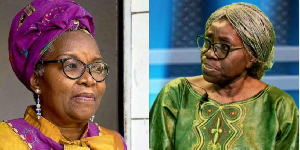Cameroon has become the seventh African country to begin using the Calculator 28, a program that calculates female ovulation to help women avoid unwanted pregnancies. The Calculator 28 can be used via mobile phone or as a kit.
Belinda Yayin was just 15 years old when she got pregnant last year. She said she wasn’t prepared to have a baby or the stigma that comes with being an unwed schoolgirl.
“I don’t even want to remember what happened. I gave birth and, two days after, I was sent back home with no follow up of what was happening to my child. The child got sick and passed away. I am almost traumatized because of this act,” said Yayin.
Belinda is one of the estimated 222 million women in developing countries the World Health Organization said would like to delay or stop childbearing but are not using any method of contraception.
Tackling the issue, Gabonese-born Paul Franck Indjendjet Gondjout came up with a new tool to help women better understand their bodies and fertility.
“Forty percent of girls and women don’t know how to calculate their menstrual cycle. And, also, a third of women have their first babies before they are 18 years old,” said Gondjout.
He developed the Calculator 28 to pinpoint ovulation – the fertile time in a woman’s monthly cycle.
“People who use our application have to send a message with the date of last menstruation and the duration and they will receive the date of next menstruation, the fertile period and the date of ovulation,” he said.
Gynecologist Tumasang Florence of the Yaounde Central Hospital said this tool can have a huge impact in Africa, where there is great need to give women more information about, and control of, their bodies.
She said Africa has serious family planning problems: a majority of women do not even know what a menstrual cycle is and 40 percent of those who do know are not capable of remembering the last date of their menses – leading to unwanted pregnancies.
While Calculator 28 is SMS-based, it can also be distributed as a kit that can show women without mobile phones how to calculate their menstrual cycle and receive information on their fertile and unsafe periods for sexual intercourse.
Gondjout said his project is off to a good start, but he’d like to raise the funds to distribute this Africa-wide.
“This appliance is already open [in use] in Gabon, in Senegal, Burkina Faso, Ivory Coast, Cameroon, and we hope in the near time it will be all over Africa. We need money to create the physical kits to give in the rural area. We need money to give these tools to the population,” he said.
Women are not the only ones interested in Calculator 28. So are some men.
Eugene Paul Ndama said he did not plan four of his wife’s nine pregnancies and he wishes they had such a tool. He said Calculator 28 could be a blessing for many schools and communities, helping young people prevent pregnancy before they are ready to handle it.
Gondjout said that as U.N. member states begin to prepare their post-Millennium Development next year, more focus should be on family planning. He notes a recent U.N. report shows that, without a better strategy, 40 percent of the 2 billion children to be born in Africa before 2035 would come from unwanted pregnancies.
Infos Santé of Tuesday, 18 November 2014
Source: VOA













